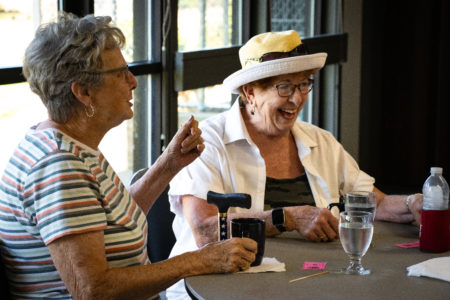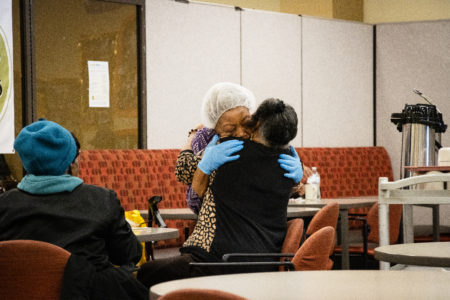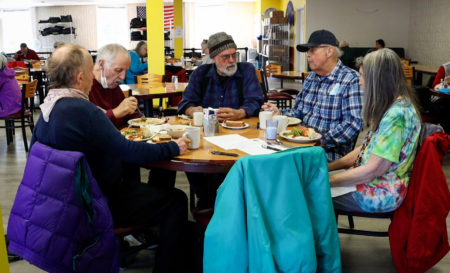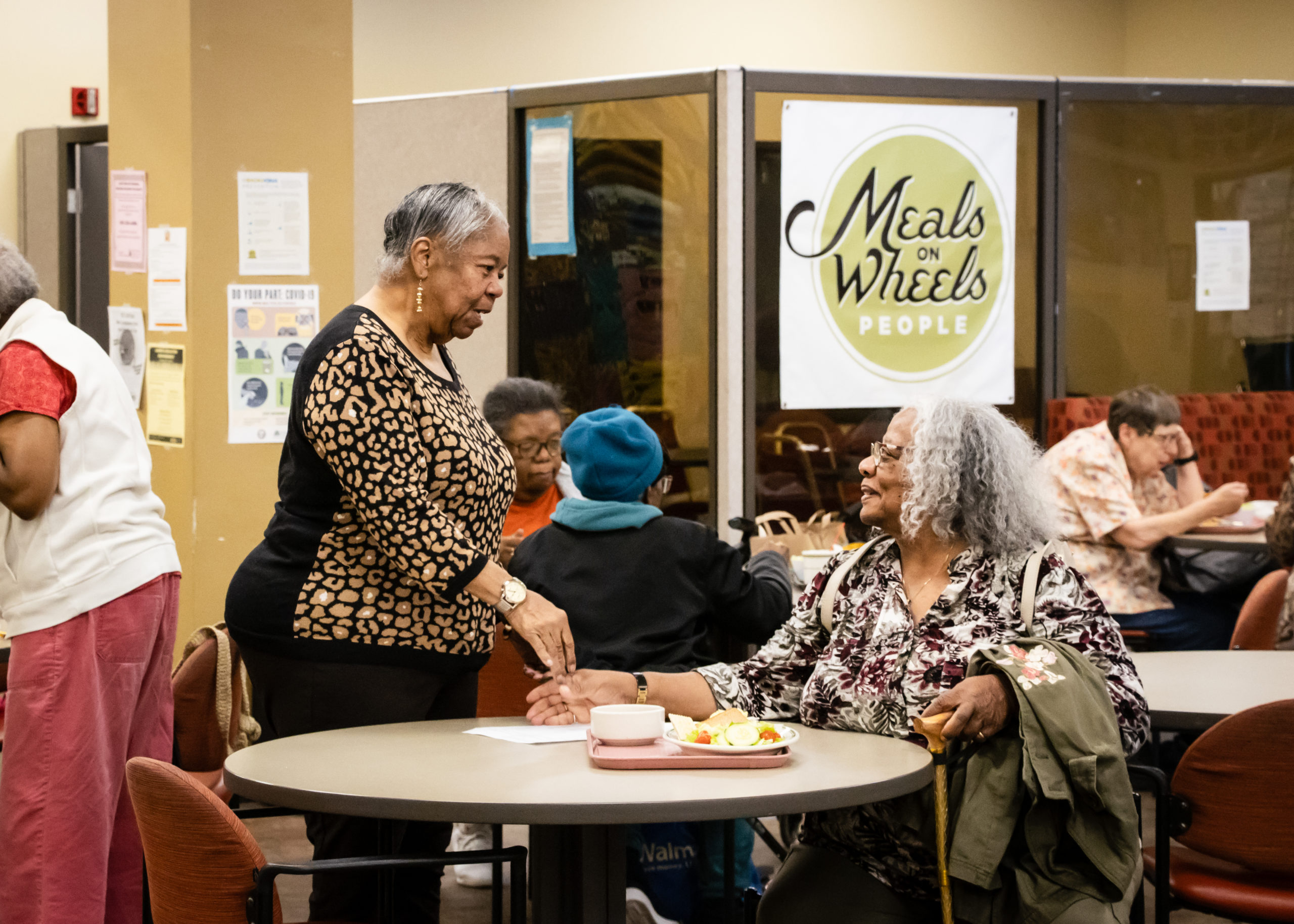An inside look at how Meals on Wheels People’s congregate lunches serve up more than just food, providing older adults with a platform for connection, camaraderie, and community engagement
Walk into the Luepke Senior Center at 11:20 a.m. on a Wednesday, and you’ll see a line of older adults waiting to get into the Meals on Wheels People congregate lunch. The doors don’t open for another 10 minutes, but the diners are excited. For many, this is their chance to connect with friends, meet new people, and build a solid support network. For others, it’s the one hot, nutritious meal they’ll have all day.
At 11:30 a.m., longtime volunteer Joanne Castaldo opens the doors and takes her position behind the check-in desk. “If you don’t open that door at 11:30, they’ll open the door and yell down,” she says.
Meals on Wheels People operates 19 dining centers throughout the Portland-Vancouver metro areas that serve congregate lunches at least one day a week. Meals are offered free of charge, though participants can make a donation. On the surface, these centers seem to be about providing a nutritious meal to those who might not otherwise have access to one. But the benefits of the congregate lunch program extend much beyond mere physical health. The true value of these lunches lies in the deeper, more holistic nourishment they provide. In these dining rooms, participants find themselves immersed in a space where shared lived experiences breed a sense of belonging and mutual understanding, an environment where they are not just accepted but truly seen.
“Somebody has to love us old people as elders,” says 88-year-old Joanne, a retired kindergarten teacher who has been volunteering since 2018 and knows nearly every diner by name. “I think that’s the biggest thing — they find similarities because sometimes our expertise or our knowledge isn’t asked for. They buzz about things they’ve done. They buzz about things that they’ve read. It gives them a chance to show how smart they are, how intelligent they are. They love to talk about their life. They like to talk about what they did in life. It’s important to them — to let people know they were important at some point in their life.”
The Bond Beyond the Meal

Teckla walks into the MOWP Luepke Center dining room and goes straight to her table — the same table she’s been sitting at for seven years. Back then, it was known as Tony’s Table (actually, they called it Tony’s Harem, but that’s another story). After Tony passed away, Teckla took over. Soon she’s joined by Lynne, Mike, Jean, Ruth, Kathy, Wally, and Sylvia.
Teckla and Lynne met at the pool at the senior center and started staying for lunch after their swim.
Jean and Teckla worked at in the kitchen at the Vancouver School District together. It took some time for Teckla to convince Jean to come to lunch. “I lost both my children, my husband, and my sister all pretty much together,” Jean says. “Teckie would just keep saying, ‘You just gotta come down and have lunch.’ I walked in and felt immediately at home. I really did.” She’s been coming ever since.
Kathy joined the table with her now-deceased husband. “After we got engaged, he brought me over here to these lovely people,” she says. “He passed away now, but I love all the friends I have from here. After my husband died, these people were supporting me. I don’t know what I’d done without it.”
Mike and Ruth are new to the group. Because Teckla’s Table is right by the front door, new diners don’t get very far before they receive an invitation. “They collected me and pulled me into their group,” says Ruth, who started coming to the congregate lunches in March. “I walked in, and they said, ‘You’re new? You’re sitting with us!’”
As the diners wait for their table to be called to walk through the food line, they discuss specials at Grocery Outlet, birthdays and zodiac signs, knee pain, how to keep squirrels off of bird feeders, and their friend who passed away last week, Richard.
“That’s why it’s so important for us to be together,” Teckla says.
Adds Lynne: “We need each other.”
Table 1 is last to be called — they were too busy talking and laughing to notice — and the diners make their way through the food line, picking up a salad, chicken and rice soup, Southwest beef and rice casserole or chicken with sour cream gravy, a fruit cup, and chocolate zucchini cake.
The conversation never stops. They talk about how good the gravy is, the TV show Bizarre Foods with Andrew Zimmern, a friend who recently broke her hip, their siblings, upcoming travel.
“I’d be lost without coming here,” Teckla says.
Adds Kathy: “As we get older, it’s kinda lonely sometimes. It helps a lot.”
A Safe Haven of Shared Experience

At Meals on Wheels People’s Martin Luther King Center located at the Multnomah County building in Northeast Portland, a group of gentlemen play dominos while some participants fill out satisfaction surveys and others share photos from the MOWP Stride for Seniors event in April. Then there’s 80-year-old volunteer Jessie Porter, making rounds with her coffee cart, adding a warm touch to the already inviting atmosphere.
As noon approaches, the center’s program manager, David Lomax, dials down the Motown tunes as he welcomes everyone to Thursday’s lunch, detailing the upcoming nutrition education event and the annual Senior Center Fashion Show, sponsored by the Urban League of Portland, also located at the center. Then David asks for a volunteer to bless the food. Mrs. Franzine volunteers: “Thank you for one more day – one more day to get it right.”
Post-prayer, Franzine joins Alfredia, Carolyn, and Mable at a table near the back. They often eat together but not always. Like many of the regulars at MLK, they’ve lived in this neighborhood for years, and nearly everyone knows everyone: Carolyn and Alfredia both attended Jefferson High School. Alfredia’s younger sister, Iris, sits at the next table. Mable volunteered at the MLK Center as a delivery driver for 26 years before she started coming for lunch. At another table nearby, Carol and Marilyn engage in a playful banter about the ownership of their shared church, each asserting their claim with a good-natured laughter: “You went to my church,” Carol says. Marilyn retorts: “That was my church!” Carol acquiesces: “It’s both of our church.”
On Mondays and Wednesdays, Alfredia eats lunch at the MOWP’s Cherry Blossom Center at the East Portland Community Center. But she considers MLK her home center. She attributes a significant part of her affection for MLK to David. His dedication to creating a lively and engaging environment is apparent in the varied events he plans. From celebrating Juneteenth, a day that marks the emancipation of those who had been enslaved in the United States, to the attending the vibrant local festival known as Good in the Hood, David ensures that the center is not just a place to eat but a place to live, learn, and celebrate. The events provide opportunities for Alfredia and other diners to engage with their culture and history and to connect with their community in a meaningful way.
Franzine captures the essence of why places like the MLK Center are so crucial. It offers a refuge of shared experience, a haven where people can gather and be among those who truly understand their journeys: “Instead of trying to get to someplace you don’t fit in because you don’t see anybody who has been through what you’ve been through or been where you’ve been, here it’s easy.”
Carol adds: “The love is already here. When you walk in the door, you can relax and know that they’re the same folk that you are. I love that. You don’t have to be all tight like a soldier. This is heaven on earth.”
A Dose of Community

At the back of the bustling MOWP Belmont Center at Tabor Square, a cluster of activity stands out. Amidst the hum of conversations and the clatter of dishes, a group of four men sling jokes across the table like salt and pepper:
“I figured out what retirement is,” Woody says.
To which Bob replies, “What is it, Boss?”
“It’s not having to figure out what you’re going to do with the rest of your life anymore,” Woody says.
For example, the crew, which ranges in age from 68 to 87 and also includes Pat (“They’re my brothers,” she says), doesn’t have to figure out what they’re doing for lunch on Mondays and Wednesdays — they’ll be at the Belmont Center, where most of them met in 2017.
Amidst the joking and the ribbing, there’s a strong undercurrent of deep connection. Like many others who frequent MOWP dining centers, they are here not just for the meals but also for the company. They come to share stories, swap jokes, and lend a listening ear. Over vegetarian sausage soup, pollack with teriyaki sauce, rice, veggies, and a fruit cocktail, they talk about nondualism and Buddhism, the time Pat spent in the Rajneesh movement, the merits of brown rice, serving in the Navy, hiking up Rocky Butte, and trans fats versus saturated fats.
Pat shares her sister passed away back in February. “Sharing it with other people my age helped relieve some of that pressure from my heart,” she says.
David, who just went through 35 grueling rounds of chemotherapy, chimes in agreement: “I just went through cancer. It was very supportive to be able to come here. Even if nobody said anything, just being with friends really helped.”
As the lunchtime gathering draws to a close, Bob stands and slides in his chair and says, “I feel like I’ve got a fix.”
For Bob, like so many others, MOWP dining centers aren’t just places to eat — they are a vital lifeline, a remedy for loneliness and isolation. Each visit is like a dose of connection and community, a much-needed “fix” that lifts spirits and nourishes souls. More than a meal, Meals on Wheels People provides a sense of belonging, a sentiment that is often harder to find but far more nourishing.
Help Us Sustain Connections and Community
Become part of our mission to provide not just meals but also community, connection, and camaraderie. By donating to Meals on Wheels People, you’ll be directly contributing to the well-being of your community.
Each meal we prepare, every event we host, and all the laughter and support we share are only made possible through the generous donations of supporters like you.
Your donation can mean the world to someone like Pat, who found comfort in sharing her grief with her peers; or David, who found strength in friendship during his cancer treatment; or Teckla and her lively table, who find joy, support, and connection in their regular MOWP lunches. By investing in MOWP, you’re investing in the well-being of your community.
Help us continue to create these safe, warm, and inviting environments where older adults in our community can share meals, stories, laughter, and a sense of belonging. Donate now and be part of the MOWP community — because we all need each other.
